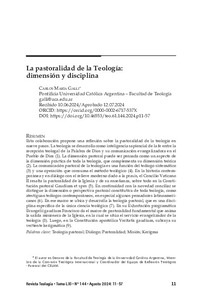Por favor, use este identificador para citar o enlazar este ítem:
https://repositorio.uca.edu.ar/handle/123456789/18705| Título: | La pastoralidad de la Teología: dimensión y disciplina The pastorality of Theology: dimension and discipline |
Autor: | Galli, Carlos María | Palabras clave: | TEOLOGIA PASTORAL; DIALOGO; PASTORALIDAD; MISION; KERIGMA | Fecha de publicación: | 2024 | Editorial: | Pontificia Universidad Católica Argentina. Facultad de Teología | Resumen: | Esta colaboración propone una reflexión sobre la pastoralidad de la teología en
nueve pasos. La teología se desarrolla como inteligencia sapiencial de la fe entre la
recepción teologal de la Palabra de Dios y su comunicación evangelizadora en el
Pueblo de Dios (1). La dimensión pastoral puede ser pensada como un aspecto de
la dimensión práctica de toda la teología, que complementa su dimensión teórica
(2). La comunicación pastoral de la teología es una función del teólogo sistemático
(3) y una operación que consuma el método teológico (4). En la historia contemporánea y en diálogo con el relieve moderno dado a la praxis, el Concilio Vaticano
II resalta la pastoralidad de la Iglesia y de su enseñanza, sobre todo en la Constitución pastoral Gaudium et spes (5). En continuidad con la novedad conciliar se
distingue la dimensión o perspectiva pastoral constitutiva de toda teología, como
atestiguan teólogos contemporáneos, en especial algunos pensadores latinoamericanos (6). En ese marco se ubica y desarrolla la teología pastoral, que es una disciplina específica de la única ciencia teológica (7). En su Exhortación programática
Evangelii gaudium Francisco da el marco de pastoralidad fundamental que anima
la salida misionera de la Iglesia, en la cual se sitúa el servicio evangelizador de la
teología (8). Luego, en la Constitución apostólica Veritatis gaudium, subraya su
vertiente kerigmática (9). This collaboration proposes a reflection on the pastorality of theology in nine steps. Theology develops as a sapiential intelligence of faith between the theological reception of the Word of God and its evangelizing communication in the People of God (1). The pastoral dimension can be thought of as an aspect of the practical dimension of all theology, which complements its theoretical dimension (2). The pastoral communication of theology is a function of the systematic theologian (3) and an operation that consummates the theological method (4). In contemporary history and in dialogue with the modern emphasis on praxis, the Second Vatican Council emphasizes the pastoral nature of the Church and her teaching, especially in the Pastoral Constitution Gaudium et spes (5). In continuity with the conciliar novelty, the pastoral dimension or perspective is distinguished as constitutive of all theology, as attested by contemporary theologians, especially some Latin American thinkers (6). Pastoral theology, which is a specific discipline of the only theological science, is located and developed within this framework (7). In his programmatic Exhortation Evangelii gaudium Francis gives the fundamental pastoral framework that animates the missionary outreach of the Church, in which the evangelizing service of theology is situated (8). Then, in the Apostolic Constitution Veritatis gaudium, he underlines its kerygmatic aspect (9). |
URI: | https://repositorio.uca.edu.ar/handle/123456789/18705 | ISSN: | 2683-7307 (online) 0328-1396 (impreso) |
Disciplina: | TEOLOGIA | DOI: | 10.46553/teo.61.144.2024.p11-57 | Derechos: | Atribución-NoComercial-CompartirIgual 4.0 Internacional | Fuente: | Teología. Tomo 61, No. 144, 2024 |
| Aparece en las colecciones: | TEO - 2024 Tomo LXI nro. 144 |
Ficheros en este ítem:
| Fichero | Descripción | Tamaño | Formato | |
|---|---|---|---|---|
| pastoralidad_ teologia.pdf | 455,19 kB | Adobe PDF |  Visualizar/Abrir |
Este ítem está sujeto a una Licencia Creative Commons

